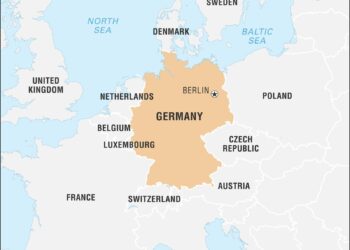In recent years, Europe has witnessed a rise in populist and nationalist political movements, with Germany’s Alternative for Germany (AfD) emerging as one of the most controversial and influential players in the political landscape. Founded in 2013 as a reaction to the eurozone crisis, the AfD has sence evolved from its original focus on monetary policy to embrace a broader platform characterized by strong anti-immigration stances, skepticism toward the European Union, and nationalist rhetoric. This shift has provoked a polarized response, raising critical questions about the implications of the party’s rise for German society and European politics at large. The American Jewish Committee (AJC) has taken a keen interest in the AfD’s trajectory, particularly concerning its impact on Jewish communities and the broader discourse on intolerance and anti-Semitism across Europe. This article seeks to delve into the origins, evolution, and core tenets of the AfD, while also examining the responses from civil society and international organizations in the context of safeguarding democratic values and combating hate.
Understanding the Ideology of the Alternative for Germany Party
The Alternative for Germany (AfD) party emerged from a backdrop of rising discontent within Germany over various issues, including immigration, the European Union, and national identity.Founded in 2013, its initial platform centered on opposition to the Euro currency and opposition to the EU’s economic policies. Over time, it has shifted to embrace more nationalist and right-wing populist ideologies, positioning itself as a defender of traditional German values. The party’s rhetoric often invokes themes of sovereignty and cultural preservation, leading to a significant following among those who feel alienated by mainstream politics.
Understanding the AfD’s ideology involves recognizing its multifaceted approach to national issues. Key aspects of this ideology include:
- Nationalism: Advocating for a strong sense of national identity and sovereignty.
- Immigration Control: Emphasizing strict immigration policies and often espousing anti-immigrant sentiments.
- Euroscepticism: Questioning the European Union’s influence over German policy decisions.
- Populism: Presenting itself as a voice for the “ordinary” German against the elite political class.
The AfD’s positions have sparked significant debate and concern regarding their implications for German society and politics. This has led to a polarized response, with supporters praising the party for representing their grievances, while critics argue it cultivates division and intolerance. Understanding this ideological landscape is crucial for assessing not only the party’s impact on Germany but also the broader European political climate.

The Rise of Populism in Germany and its Political Implications
The Alternative for Germany (AfD) has emerged as a significant political force within the German landscape, capitalizing on rising discontent with traditional parties. Rooted in a combination of nationalism and skepticism toward immigration,the AfD’s platform has been galvanizing for many citizens. This party has been characterized by its anti-elite rhetoric,appealing to a segment of the population that feels marginalized by the establishment. The AfD’s influence is notably felt in eastern states,where economic stagnation and immigration concerns resonate deeply with voters. As it positions itself as a defender of German culture and values, the party continues to gain traction among those who see it as a bulwark against globalization and the perceived erosion of national identity.
The rise of this party poses significant challenges to Germany’s established political order. Traditional parties are grappling with the implications of the AfD’s growing presence in the Bundestag, leading to a recalibration of political discourse. Unfolding tensions include:
- Erosion of Traditional Party Bases: Mainstream parties like the CDU and SPD find their voter bases diminishing,as more individuals turn to the AfD for representation.
- Increased Polarization: The political climate is becoming increasingly divisive, complicating coalition-building efforts and governance.
- Impact on Policy Making: The need to address the concerns raised by AfD supporters may force mainstream parties to change their policies,particularly regarding immigration and integration.
Thes factors suggest a potential long-term realignment of Germany’s political scene, influencing both domestic policy and the country’s position within the European Union.

The Impact of AfDs Policies on Minority communities
The policies advocated by the AfD have raised significant concerns regarding their implications for minority communities in Germany. Generally positioned at the right end of the political spectrum, the party promotes a nationalist agenda that often excludes and marginalizes diverse groups. Specific policies include:
- Anti-immigration stance: The AfD’s calls for stricter immigration controls have led to increased hostility towards asylum seekers and migrant populations.
- Promotion of National Identity: The party’s emphasis on traditional German values frequently enough undermines the acceptance of minorities, especially those of different ethnic or cultural backgrounds.
- Curbing Multiculturalism: Their resistance to multicultural policies has resulted in a social habitat less tolerant of diversity.
Moreover, the AfD’s rhetoric has emboldened extremist groups and individuals, contributing to a rise in hate crimes and xenophobia within communities.This alarming trend negatively affects social cohesion and instills fear among minority groups, who find themselves increasingly isolated. A recent survey revealed the following alarming statistics regarding perceptions among minority communities:
| Perception | Percentage of Minority Respondents |
|---|---|
| felt unsafe in public spaces | 68% |
| Experience of discrimination | 52% |
| Government support perceived as inadequate | 75% |
As the AfD continues to gain traction, its policies and rhetoric have cultivated an environment where intolerance flourishes, substantially impacting the lives and well-being of minority communities across Germany.
Addressing Antisemitism and Extremism within the AfD Framework
within the political landscape of germany, the alternative for Germany (AfD) has garnered attention not only for its economic policies but also for its approach to societal issues, particularly regarding antisemitism and extremism. Over the years, there have been numerous instances where members of the AfD have made statements or taken positions that have raised concerns among various communities, notably the Jewish population. Reports have indicated a troubling trend of accepting or even promoting viewpoints that challenge the historical context of antisemitism, which risks normalizing extremist ideologies within mainstream political discourse.
Addressing these concerns necessitates a multi-faceted approach, urging both internal accountability within the AfD and external pressure from civil society. Key strategies include:
- Promoting Education: Enhancing awareness about the dangers of antisemitism and the historical context of Jewish persecution.
- Encouraging Dialog: Fostering open discussions that include voices from the Jewish community to promote understanding and reconciliation.
- establishing Clear Stances: Advocating for clear condemnations of antisemitic rhetoric and actions from party leadership.
- Monitoring Extremist activities: Collaborating with civil organizations to track and address instances of extremism that may emerge from within the party.
Additionally, a recent analysis of political discourse surrounding the AfD highlighted the importance of understanding how antisemitism manifests in contemporary contexts. An examination of party statements versus the party’s actions can be insightful:
| Statement/Action | Context |
|---|---|
| Support for anti-israel rhetoric | Conflation of critique with antisemitism. |
| Leadership’s silence on antisemitic incidents | Lack of accountability enhances extremist narratives. |
| Engagement with far-right groups | Reinforces ties that can legitimize extremist ideologies. |

Strategies for engaging with AfDs Support Base for Positive Change
Engaging with the support base of the Alternative for germany (AfD) requires a nuanced approach that fosters dialogue and understanding.Building trust is essential; thus, initiatives should focus on community outreach and inclusive discussions that invite AfD supporters to express their concerns and aspirations. Emphasizing shared values such as national pride and economic security can definitely help bridge gaps. Strategies might include:
- Hosting town hall meetings to discuss community concerns
- Creating platforms for direct dialogues between AfD supporters and broader civic groups
- Promoting local projects that address shared issues, like housing or employment
Additionally, employing targeted interaction strategies can shift perspectives and promote positive engagement. Utilizing social media platforms allows for real-time conversations, enabling stakeholders to present alternative narratives and counter misinformation. Establishing partnerships with trusted local leaders who can advocate for constructive discourse may also be beneficial. Key methods might involve:
- Launching campaigns that highlight success stories of collaboration
- Distributing informative materials that address common misconceptions
- Encouraging participation in community service activities to showcase the benefits of unity

Recommendations for Strengthening Democratic Values in Germany
To foster a more robust commitment to democratic values in Germany,it is essential to engage citizens in constructive dialogue and education regarding civic responsibility and the dangers posed by extremist ideologies. Educational initiatives can be bolstered through community workshops,school programs,and public forums aimed at fostering understanding of democratic principles such as tolerance,inclusion,and free speech. By promoting a culture of open debate and critical thinking, individuals in communities that may feel disenfranchised can become more resilient against populist rhetoric that seeks to divide.
Additionally, establishing and supporting strong civic organizations can play a vital role in counteracting extremist influences. These groups can actively engage with marginalized populations to address their grievances through peaceful means. A focus on social cohesion can be achieved through initiatives such as:
- Networking platforms that connect citizens from diverse backgrounds
- Community-building projects aimed at fostering dialogue
- empowerment programs that promote leadership skills among youth
By enhancing civic engagement and promoting solidarity across different demographics, Germany can fortify its democratic foundations and mitigate the appeal of radical movements.
Key Takeaways
the Alternative for Germany (afd) party represents a complex and contentious force within the German political landscape. Emerging from its origins as an anti-euro party,the AfD has evolved into a national political entity that grapples with issues ranging from immigration to nationalism. Its rise has prompted significant debate not only within Germany but also across Europe and beyond, raising critical questions about the future of democracy, social cohesion, and the values that underpin contemporary society.
As organizations like the American Jewish Committee emphasize, understanding the AfD is crucial for addressing the broader implications of its ideology and actions, particularly in relation to tolerance and the safety of minority communities. The party’s controversial positions necessitate ongoing scrutiny and dialogue, as their impact extends beyond German borders, influencing perceptions of nationalism and populism in global contexts.
Moving forward, it is essential for both citizens and policymakers to remain vigilant and informed about the dynamics at play within the AfD and to foster a political environment that upholds democratic principles and human rights for all. As Germany navigates this political landscape,the lessons learned will resonate across various democracies confronting similar challenges.














